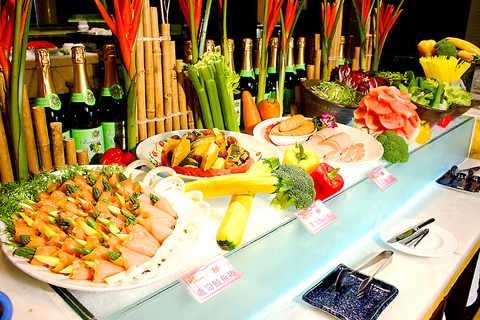Buffet restaurants are a common part of the landscape in Taipei offering Japanese, Chinese and Western fare. Rarely does a restaurant incorporate food from so many different cultures into one gluttonous whole like Splendor Restaurant, which is conveniently located three minutes walk, or a longer waddle after dining, from Dapinglin (大坪林) MRT station.
The dining area is large with the buffet taking up one-quarter of the restaurant. The decor is minimalist with black marble walls, white marble tabletops and black rubber chairs that hug the body. The designers of the restaurant clearly understood the distraction that a wide variety of food causes diners, and as a result there is plenty of space to move about when going up for a fourth or fifth helping.
Hip hostess Tseng Yue-li (曾月裡) makes it clear that eating at Splendor should be a total dining experience, not just an excuse to expand your waistline. As such, she recommends trying a variety of dishes before gorging on any one dish from a particular region.

PHOTO COURTESY OF SPLENDOR RESTAURANT
If you are a lover of seafood, the Japanese section has many surprises. In addition to the usual suspects of sashimi, tempura and a variety of hot pot dishes, there are a variety of fresh seafood salads on offer. But what separates this Japanese-themed section from its counterparts is its large assortment of freshly caught fish laid out on a bed of ice or swimming in large tanks.
The wide range of Cantonese cuisine, especially the dim sum, is particularly worthy of mention. With such an array to choose from, it's best to tuck in when the place is busy as eating dumplings that have been sitting for 15 or more minutes is not recommended.
For those who are not afraid of a little protein, prime rib and cooked ham are available. Carved before your eyes, both are cooked to perfection and will be sliced thin or thick, according to your appetite. There is also bratwurst, barbecued mushrooms and a variety of other meats.
Rounding out the meal, if you can fit it in, are eight varieties of Haagen-Dazs ice cream and a staggering variety of desserts, though on this last score I cannot comment, as I was too busy with the ice cream. The restaurant offers bottomless beer and red and white wine. The Taipei Times reminds patrons to drink responsibly.

Most heroes are remembered for the battles they fought. Taiwan’s Black Bat Squadron is remembered for flying into Chinese airspace 838 times between 1953 and 1967, and for the 148 men whose sacrifice bought the intelligence that kept Taiwan secure. Two-thirds of the squadron died carrying out missions most people wouldn’t learn about for another 40 years. The squadron lost 15 aircraft and 148 crew members over those 14 years, making it the deadliest unit in Taiwan’s military history by casualty rate. They flew at night, often at low altitudes, straight into some of the most heavily defended airspace in Asia.

Beijing’s ironic, abusive tantrums aimed at Japan since Japanese Prime Minister Sanae Takaichi publicly stated that a Taiwan contingency would be an existential crisis for Japan, have revealed for all the world to see that the People’s Republic of China (PRC) lusts after Okinawa. We all owe Takaichi a debt of thanks for getting the PRC to make that public. The PRC and its netizens, taking their cue from the Chinese Communist Party (CCP), are presenting Okinawa by mirroring the claims about Taiwan. Official PRC propaganda organs began to wax lyrical about Okinawa’s “unsettled status” beginning last month. A Global

Taiwan’s democracy is at risk. Be very alarmed. This is not a drill. The current constitutional crisis progressed slowly, then suddenly. Political tensions, partisan hostility and emotions are all running high right when cool heads and calm negotiation are most needed. Oxford defines brinkmanship as: “The art or practice of pursuing a dangerous policy to the limits of safety before stopping, especially in politics.” It says the term comes from a quote from a 1956 Cold War interview with then-American Secretary of State John Foster Dulles, when he said: ‘The ability to get to the verge without getting into the war is

Like much in the world today, theater has experienced major disruptions over the six years since COVID-19. The pandemic, the war in Ukraine and social media have created a new normal of geopolitical and information uncertainty, and the performing arts are not immune to these effects. “Ten years ago people wanted to come to the theater to engage with important issues, but now the Internet allows them to engage with those issues powerfully and immediately,” said Faith Tan, programming director of the Esplanade in Singapore, speaking last week in Japan. “One reaction to unpredictability has been a renewed emphasis on